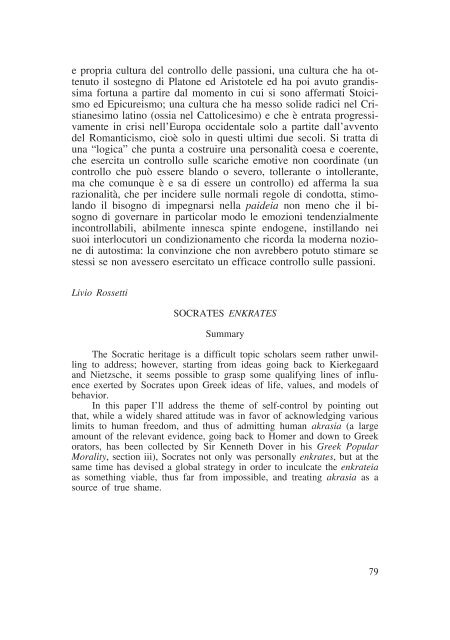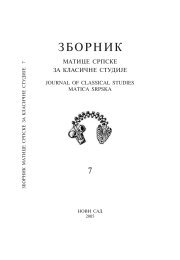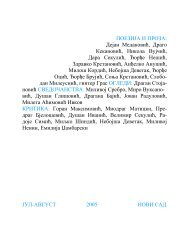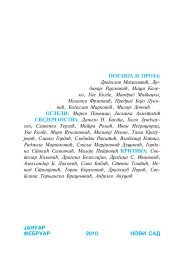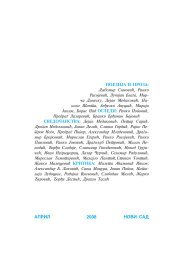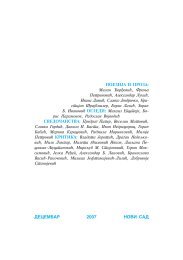- Page 1:
ZBORNIK MATICE SRPSKE ZA KLASIÅNE
- Page 4 and 5:
YU ISSN 1450-6998 | UDC 930.85(3)(0
- Page 6 and 7:
¡¡ Emilia Masson (Paris), Autour
- Page 8:
Zbornik Matice srpske za klasiåne
- Page 11 and 12:
Prireðene i prevedene kwige Ludvig
- Page 13 and 14:
Ÿak Mono: Inauguralna beseda. Leto
- Page 15 and 16:
Kratka „istorija lingvistike" Vat
- Page 17 and 18:
Oblikovawe gråkog åoveka. Verner
- Page 19 and 20:
Planovi za Treãi milenijum: O budu
- Page 21 and 22:
PerÆ cÿsewj u srpskim åasopisima
- Page 23 and 24:
gleskom: Dragoslav Srejoviã' Views
- Page 25 and 26:
Neutaÿiva ÿeð seãawa. Neohelens
- Page 27 and 28:
Za balkansku kwiÿevnu enciklopedij
- Page 29 and 30:
Antiåke helenske teme u savremenom
- Page 31 and 32: O istorijskom romanu kod Grka. Pred
- Page 33 and 34: Srpski biografski reånik, Novi Sad
- Page 35 and 36: Verska tolerancija i uloga religije
- Page 37 and 38: Milka Iviã, Zbornik za filologiju
- Page 40 and 41: Carl Joachim Classen UDC 821.14'02-
- Page 42 and 43: Hier soll die Frage beantwortet wer
- Page 44 and 45: persönlichen krançw oder cronçw
- Page 46 and 47: (ñxurÁj gÀr moi keìnoj ãm%j 'A
- Page 48 and 49: diese (eben zitierten) Verse zu Ody
- Page 50: während sie für Platon als ein wi
- Page 53 and 54: titles and corollary functions ascr
- Page 55 and 56: subsequent birds, none of which as
- Page 57 and 58: Odysseus' western archipelago befor
- Page 59 and 60: HERMES (Hymns 4, 18, and 29; also 1
- Page 61 and 62: All of this lets us better read det
- Page 63 and 64: in cult, and in iconography. The Fi
- Page 65 and 66: of the central Balkans or across no
- Page 68 and 69: Livio Rossetti SOCRATE ENKRATES UDC
- Page 70 and 71: L'ottimismo socratico sulla capacit
- Page 72 and 73: ma e dopo Socrate e, su questa base
- Page 74 and 75: cente, a mio avviso, nel farci capi
- Page 76 and 77: mettere, reprimere le passioni, o l
- Page 78 and 79: Socrate trova il suo fondamento in
- Page 80 and 81: zava di incrinare le (false) sicure
- Page 84 and 85: Leonidas Bargeliotes UDC 162.6 Plat
- Page 86 and 87: cal Poiesis, that is, the rediscove
- Page 88 and 89: egard what has turned out to be mos
- Page 90 and 91: mediators indeed for the approximat
- Page 92 and 93: culture. Anton sees that the only s
- Page 94 and 95: lopments in Western social and poli
- Page 96 and 97: who marked that everyone was born i
- Page 98 and 99: Soteres Fournaros GREGORY VLASTOS'
- Page 100 and 101: On the basis of questioning Socrate
- Page 102 and 103: portrayed in the Platonic Socrates
- Page 104 and 105: that if I had tried to do politics
- Page 106 and 107: tes at the heart of Socrates' ethic
- Page 108 and 109: questions Socrates' “most just" a
- Page 110 and 111: Søawomir Sprawski UDC 2-162.6(38)
- Page 112 and 113: formation that the philosopher wrot
- Page 114 and 115: penteconter or 50-oared ship. 12 It
- Page 116 and 117: 1 st ,4 th and even 5 th century BC
- Page 118 and 119: Athens, but it is difficult to dete
- Page 120 and 121: Zsigmond Ritoók THE SEIKILOS POEM
- Page 122 and 123: nothing of them is given as a prese
- Page 124 and 125: Another kind of use of the same con
- Page 126: ance(s) he should put into the text
- Page 129 and 130: eÿnosti duše moraju uãi i animir
- Page 131 and 132: azloga), moÿe biti u svakom sluåa
- Page 133 and 134:
ma da siðu u njega. Direktan konta
- Page 135 and 136:
tat, individualna duša je duboko p
- Page 137 and 138:
cijaciji sa telom' predoåava ono
- Page 139 and 140:
svega toga, vezivanje jeste, a isto
- Page 141 and 142:
ki jih bom opisoval, zdele zanamcem
- Page 143 and 144:
politiki, o njegovih zakulisnih spl
- Page 145 and 146:
vina ni pomenila, tako kot si je ÿ
- Page 147 and 148:
celait à son regard une mémoire c
- Page 149 and 150:
sentation iconographique, combien
- Page 151 and 152:
Grâce au hasard des découvertes o
- Page 153 and 154:
départ, dirions nous. Le rêve qui
- Page 155 and 156:
thought structures and habits to su
- Page 157 and 158:
ate in the Iliad, mean objective di
- Page 159 and 160:
hubris and koros lead a great man t
- Page 161 and 162:
dead is a sign of their filial and
- Page 163 and 164:
culture-pattern which is used as a
- Page 165 and 166:
The Wider Perspective of Some Commo
- Page 167 and 168:
India where it was clearly expresse
- Page 169 and 170:
Rama: Yataha Soumitrihi | Shramanaa
- Page 171 and 172:
tion samienne, faisait partie d'une
- Page 173 and 174:
aproché ces fées célestes avec l
- Page 175 and 176:
protoforme indo-européenne, sravah
- Page 177 and 178:
n'etaient que personnifications du
- Page 179 and 180:
�������� «terrible
- Page 181 and 182:
finales vers la fin du 1er milléna
- Page 183 and 184:
des funérailles, a composé une ch
- Page 185 and 186:
Brynhildar («Chevauchée de Brynhi
- Page 187 and 188:
Mayrhofer KEWA: M. Mayrhofer, Kurze
- Page 189 and 190:
ezervisanim kod Homera za oplakivaw
- Page 191 and 192:
183). Pitawe leksiåkih dubleta slo
- Page 193 and 194:
(v) grå. tacuv (3) > stsl. vx skor
- Page 195 and 196:
oslovenska jevanðeqa svedoåe o uk
- Page 197 and 198:
Srðan Šarkiã UDC 342.25(497.11)
- Page 199 and 200:
suprotno: kad god se odmeãe jedna
- Page 201 and 202:
trebqava izraze ������
- Page 203:
Srðan Šarkiã AUTONOMY (AYTONOMIA
- Page 206 and 207:
¡ Za savremenog posmatraåa, hybri
- Page 208 and 209:
kazuistiåno procewivawe da li se p
- Page 210 and 211:
u kome se pomiwe hybris. 12 Naime,
- Page 212 and 213:
do kraja ili ne dobije najmawe jedn
- Page 214 and 215:
pitawe da li je postojala primena f
- Page 216 and 217:
preciznosti prilikom normirawa. Nai
- Page 218 and 219:
kubine smatralo za hybris. 39 Da li
- Page 220 and 221:
wega ili od treãeg lica dobije pri
- Page 222 and 223:
Meðutim, i u savremenim pravnim si
- Page 224 and 225:
y judges, particularly connected wi
- Page 226 and 227:
Moreover, ancient literary themes a
- Page 228 and 229:
approximately fifty-eight per cent.
- Page 230 and 231:
the encouragement of Hellenic langu
- Page 232 and 233:
1. The archipelago of Third Humanis
- Page 234 and 235:
2. Humanism and mystic It is possib
- Page 236 and 237:
des Licht und der Liebe, und sein N
- Page 238 and 239:
Karoline von Günderode, the author
- Page 240 and 241:
Danijela Stefanoviã EGIPAT I NUBIJ
- Page 242 and 243:
Sredwe carstvo (oko 2055—1650. go
- Page 244 and 245:
Za potrebe vojnih akcija uperenih k
- Page 246 and 247:
Buhen (površine 172 h 160 m) koji
- Page 248 and 249:
1980: 93; Dunham 1960: 124—125).
- Page 250 and 251:
¡¢ u Nubiji su se pojavili prvi z
- Page 252 and 253:
mawe šest utvrðenih gradova je po
- Page 254 and 255:
govaåkih puteva, ali Vilijams isti
- Page 256 and 257:
wegove blizine regionu rudnika zlat
- Page 258 and 259:
Habachi, L. (1963) King Nebhepetre
- Page 260 and 261:
Wells, J. W. (1994) Sesosrtis III's
- Page 262 and 263:
Rastko Vasiã DVOJNE IGLE OPET UDC
- Page 264 and 265:
glašenim ramenima, a druga je tipi
- Page 266 and 267:
vu toga moÿda pripada još ¢¡ ve
- Page 268 and 269:
Eckart Frey UDC 26„652"-86E SEIN
- Page 270 and 271:
Bei Philon finden sich derartige Be
- Page 272 and 273:
len, sondern auch von sehr guten Ki
- Page 274 and 275:
Die angeführten antiken Quellen be
- Page 276 and 277:
lieben, wie sich selbst, und einen
- Page 278 and 279:
Dieser Bewertung stehen die Ausfüh
- Page 280 and 281:
se sich selbst überlassen wurden u
- Page 282 and 283:
Efstratios Teodosiju, Petros Mandar
- Page 284 and 285:
Ovaj pojam je presudan u obrazlagaw
- Page 286 and 287:
silu ili energiju, neograniåenu u
- Page 288 and 289:
3. DRUGI FILOSOFI O BESKONAÅNOSTI
- Page 290 and 291:
konaånog, a zlo iz beskonaånog:
- Page 292 and 293:
tiåkog i kozmološkog gledišta. T
- Page 294 and 295:
konaånosti postoji pre kvalitativn
- Page 296 and 297:
nu samo-sliånosti, tako da je svak
- Page 298:
Linde, A., The self-Reproducing inf
- Page 301 and 302:
ÿivqewa. I veã tu postaje, u weno
- Page 303 and 304:
štijem planu razumevawa kulture op
- Page 305 and 306:
dalskom pogledu. Saznati, otud, nal
- Page 308 and 309:
Dr. Leonidas Bargeliotis, Universit
- Page 310 and 311:
SARADNICI ZBORNIKA MATICE SRPSKE ZA


